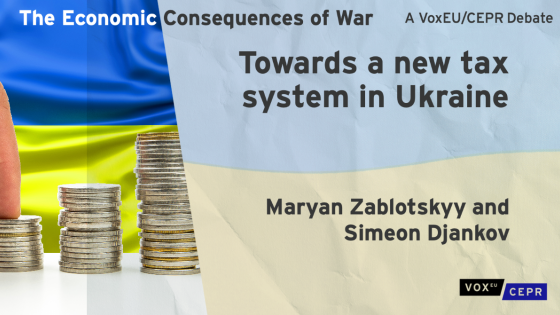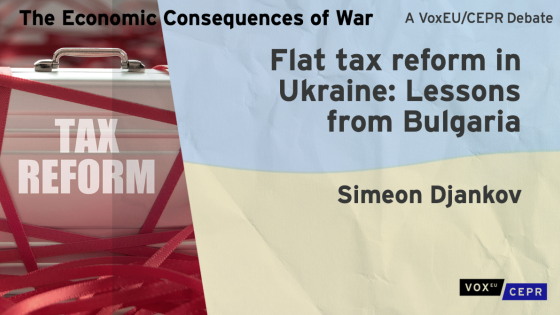The tax rules theorem by Diamond and Mirrlees (1971) dictates that tax policy should not affect the production decisions by firms, a dictum that eliminates taxes on intermediate inputs, trade, or turnover from the policy kit of an enlightened government. Yet, this is exactly what tax policy in Ukraine looks like, even before Russia’s 2022 invasion.
There may be reasons why the optimal tax policy in Ukraine may diverge from what is prescribed in the celebrated Diamond-Mirrlees model. A turnover tax, for instance, is more difficult to evade than a profit tax and so can be optimal in high-evasion economies. Also, when tax administration capacity is low, using tax instruments such as turnover taxes or trade taxes can give governments the fiscal space to invest in public goods or, in Ukraine’s case, to defend its citizens against Russia’s aggression. However, the evolution of administrative capacity tends to be slow-moving and depends on factors that are beyond direct policy control (Best et al. 2015, Jensen 2015).
Tax evasion is a pervasive phenomenon in emerging markets, especially in the economies of the former Soviet Union (Miklos 2014, Djankov et al. 2002). The high elasticity of taxable income with respect to tax rates found in the public finance literature implies deadweight losses arising from distorting labour supply and capital accumulation decisions (Feldstein 1995, Djankov et al. 2010, Elgin 2012). If a system of lower uniform taxes were introduced in Ukraine instead, tax evasion will abate and the share of informality may fall significantly (Djankov 2022).
In this column we describe the main features of the tax regime in Ukraine. This regime is characterised by significant legal loopholes that make the statutory tax rates subject to wide interpretation and result in frequent negotiations between businesses and the tax authority. These negotiations distort the application of tax rules, often in favour of better-connected businesses. Tax collection is significantly below what the statutory rate would imply, for example less than half in the case of the value-added tax. Such deviations call for a rethink of the tax regime towards a simpler uniform tax rate like the one present in other European economies like Bulgaria.
The Ukrainian tax system in practice
Ukraine’s tax system functions primarily on the basis of unofficial rules of tax collection that differ significantly from those set out in the Tax Code. This divergence between law and practice predates Russia’s invasion. While VAT is formally levied at 20%, in 2021 effective VAT was not higher than 10% if one calculates the volume of VAT divided by the retail trade volume. In other words, VAT is often avoided and there are legal mechanisms to achieve such avoidance, for example by declaring that you sell good worth under $25,000 through multiple entities that register as private entrepreneurs. Using the status of a private entrepreneur legally entitles you to a lower VAT bracket of either 2% or 5% of revenue. Many services, including in large companies, are billed as entrepreneurial activities and fall under these lower rates. It is often the case that even the top managers of large companies receive their compensation as private entrepreneurs.
Becoming an informal business is also an option. The World Bank (2021) estimates that prior to Russia’s invasion 42% of companies in Ukraine operated in the shadow economy. This high share of informality is complemented by a blossoming market for fake transactions where companies pretend to sell each other goods they no longer have or have never had. This is done to claim VAT refunds.
As another example, the personal income tax and social contributions are formally levied at 51% of the employee’s net salary. However, around 90% of surveyed businesses claim that they minimise the tax on their employees and in 2021 about 60% of this tax was collected from public-sector employees, which accounted for less than 15% of total employment before the war (Blinov and Djankov 2022).
As a third example, the corporate income and dividend tax is formally levied at 18%, yet over 70% of corporate tax revenue in 2021 came from the dividend tax paid by large (mostly international) corporations. Small businesses de facto pay a turnover tax, which formally does not exist in Ukraine. Such businesses receive directive from tax officials to pay a certain percentage of their revenue - between 1% and 5% depending on the sector. Often, the turnover tax is paid ‘voluntarily’ as corporate income tax.
Also, export duties officially exist only on scrap metal and sunflower seeds but in reality these are paid by every exporter. In contrast, VAT on exports is not refunded in full. The state budget has accrued significant arrears in VAT refunds. These arrears are not solely the result of the war and have been a chronic problem for the past 15 years. In 2010, VAT refunds were so much behind schedule that the Ukrainian government was forced to issue special VAT government bonds to compensate for the arrears in VAT refunds.
These are just some examples that characterise the Ukrainian tax system that leaves a lot of discretion in the hands of tax collectors. For the majority of businesses the tax regime looks like this: the manager receives a call from the tax authority with a request to pay a certain percentage of revenue. Each company reaches an informal agreement with the tax officials on the size of the suggested tax payment and its distribution across tax categories (corporate income tax, VAT, export duties, employee contributions). Due to the close relationships that tax officials develop with company managers, favoured companies shoulder a lower tax burden, distorting competition.
Such tax collection leads to hidden budget deficits, especially worrisome in the time of crisis when the deficit balloons for macroeconomic reasons as well. The informal economy continues to thrive, as the incentives to be formal are small compared to the value of tax avoidance. Corruption thrives too, as tax collectors have significant discretion to apportion tax burden across businesses.
What can be done?
Ukraine needs a new tax system, one that provides incentives to come out of the shadow economy. The main goal of this new system is to reach an equilibrium where businesses and individual entrepreneurs will pay predictable, uniform taxes prescribed in the law. In this new equilibrium the cost of tax avoidance will be higher than the benefits. By lowering taxes the number of businesses who are willing to comply will rise, more than compensating the foregone revenue. This is what happened in Bulgaria (Djankov 2022) and in every other post-socialist economy that adopted uniform taxation (the so-called flat tax).
Reform to introduce the lower uniform tax has often been accompanied by some elimination or reduction of exemptions under both personal and corporate income tax, whether in terms of bringing capital income into the tax base or eliminating preferences for particular taxpayers or activities. Privileged groups like private entrepreneurs or professional services (like consultants or lawyers) have been pulled into the common uniform tax as a way to increase public revenues and make the tax system more equitable (Keen et al. 2006, IMF 2019).
A cautious reformer may say: why not simply close off any loopholes that allow tax avoidance. The answer is that only radical and well-communicated change in the tax treatment of businesses will stop many of them from leaving Ukraine because of the horrific Russian invasion. In 2022, for example, 45% of newly created businesses in Poland were registered by Ukrainians; about a third of new businesses in Czechia had Ukrainian owners. Ukraine is losing its entrepreneurial talent fast.
In times of tremendous crisis the state has to act forcefully to protect its citizens. The Ukrainian government has done so on the military front, it has to do so on the tax front too.
References
Best, M, A Brockmeyer, H Kleven, J Spinnewijn and M Waseem (2015), “Production vs Revenue Efficiency with Limited Tax Capacity: Theory and Evidence from Pakistan”, Journal of Political Economy 123(6): 1311-1355.
Blinov, O and S Djankov (2022), “Ukraine’s deepening population challenge”, VoxEU.org, 28 June.
Diamond, P and J Mirrlees (1971), “Optimal Taxation and Public Production: Tax Rules”, American Economic Review 61(1): 261-278.
Djankov, S (2022), “Flat tax reform in Ukraine: Lessons from Bulgaria”, VoxEU.org, 11 December.
Djankov, S, R L Porta, F Lopez-de-Silanes and A Shleifer (2002), “The regulation of entry”, Quarterly Journal of Economics 117(1): 1-37.
Djankov, S, T Ganser, C McLiesh, R Ramalho and A Shleifer (2010), “The Effect of Corporate Taxes on Investment and Entrepreneurship”, American Economic Journal: Macroeconomics 2(3): 31-64.
Elgin, C. (2012), “Countercyclical informal economy”, Review of Development Economics 16(4): 527-540.
Feldstein, M (1995), “The Effect of Marginal Tax Rates on Taxable Income: A Panel Study of the 1986 Tax Reform Act”, Journal of Political Economy 103(3): 551-572.
IMF (2019), “Corporate Taxation in The Global Economy”, IMF Policy Paper, 29 March.
Jensen, A (2015), “Employment Structure and the Rise of the Modern Tax System”, LSE Working Paper, December.
Keen, M, Y Kim and R Varsano (2006), “The “Flat Tax(es)”: Principles and Evidence”, IMF Working Paper WP/06/218.
Miklos, I (2014), “Slovakia: The Latecomer That Caught Up”, in A Aslund and S Djankov (eds), The Great Rebirth: Lessons from the Victory of Capitalism over Communism, Peterson Institute for International Economics.
Waseem, M, J Spinnewijn, A Brockmeyer, H Kleven and M Best (2016), “Designing tax policy in high-evasion economies”, VoxEU.org, 5 January.
World Bank (2021), The Long Shadow of Informality: Challenges and Policies, World Bank.


